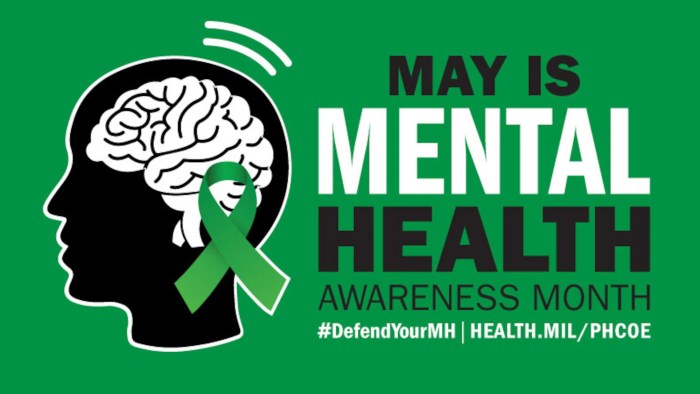Mental Health Awareness is key in today’s society, shedding light on crucial issues and sparking important conversations. From combating stigma to promoting education, let’s dive into the impact and significance of this vital movement.
Mental Health Awareness Campaigns

Mental health awareness campaigns play a crucial role in society by educating the public, reducing stigma, and increasing support for individuals facing mental health issues. These campaigns help create a more inclusive and understanding environment for those struggling with their mental health.
Importance of Mental Health Awareness Campaigns
- Educate the public about mental health: By raising awareness, these campaigns help dispel myths and misconceptions surrounding mental health conditions.
- Reduce stigma: By promoting open conversations and sharing personal stories, these campaigns work towards reducing the stigma associated with mental health issues.
- Increase support: By providing resources, information, and support networks, these campaigns help individuals feel empowered to seek help and access the assistance they need.
Examples of Successful Mental Health Awareness Campaigns
- The “Bell Let’s Talk” campaign in Canada has been instrumental in starting conversations around mental health and raising funds for mental health initiatives.
- The “It’s Okay To Not Be Okay” campaign by the National Alliance on Mental Illness (NAMI) has helped normalize discussions about mental health struggles.
- The “Seize the Awkward” campaign focuses on encouraging young adults to have open conversations about mental health and check in with friends who may be struggling.
How Campaigns Reduce Stigma and Increase Support
- By sharing personal stories and experiences, these campaigns humanize mental health issues and show that anyone can be affected.
- Providing information on how to seek help and access resources empowers individuals to take action and prioritize their mental well-being.
- Engaging with the community through events, social media, and outreach programs helps create a supportive network for those struggling with mental health challenges.
Impact of Mental Health Awareness
Mental health awareness initiatives have had a significant impact on individuals, communities, and workplaces. By raising awareness about mental health issues, society has become more informed and empathetic towards those struggling with mental health challenges. This increased awareness has led to a variety of positive outcomes.
Impact on Individuals
Individuals are now more likely to recognize the signs of mental health issues in themselves and seek help when needed. This has resulted in improved access to mental health services and reduced stigma surrounding mental health conditions.
Impact on Communities
Communities have seen a shift in attitudes towards mental health, with increased support and resources for those in need. Mental health awareness campaigns have encouraged community members to come together to promote mental well-being and provide assistance to those struggling.
Impact on Workplaces
Workplaces have also been positively affected by mental health awareness initiatives. Employers are now more likely to prioritize employee well-being and offer mental health support programs. This has led to a more open and understanding work environment, where employees feel comfortable discussing their mental health concerns.
Addressing Mental Health Stigma: Mental Health Awareness

Addressing mental health stigma is a crucial part of promoting overall mental well-being and encouraging individuals to seek help without fear of judgment.
Role of Mental Health Awareness
Mental health awareness plays a key role in combating stigma by educating the public about mental health conditions, treatment options, and the importance of seeking help. By increasing awareness, individuals are more likely to understand that mental health issues are common and can affect anyone.
Challenging Stereotypes and Misconceptions
- Using storytelling and personal experiences to humanize mental health conditions and show that they are not a sign of weakness.
- Encouraging open conversations about mental health to break down barriers and promote understanding.
- Providing accurate information about mental health to dispel myths and misconceptions.
Initiatives to Reduce Stigma, Mental Health Awareness
- The “Stamp Out Stigma” campaign, which uses social media and community events to raise awareness and promote acceptance.
- Training programs for healthcare professionals to reduce stigma and provide compassionate care to individuals with mental health issues.
- Peer support groups and mental health advocacy organizations that work to reduce stigma through education and support.
Supporting Mental Health Education
Integrating mental health education into school curriculums is crucial for equipping children and teenagers with the knowledge and skills to understand, manage, and prioritize their mental well-being.
Importance of Early Education
Early education on mental health awareness can lead to increased resilience, improved coping mechanisms, and enhanced emotional intelligence among young individuals.
- Empowers students to recognize signs of mental health issues in themselves and others.
- Reduces stigma surrounding mental health by promoting open conversations and seeking help when needed.
- Provides tools and resources to build positive mental health habits from a young age.
Improving Overall Well-being
Mental health education not only enhances individual well-being but also contributes to a healthier and more supportive school environment.
- Encourages empathy, understanding, and support for peers facing mental health challenges.
- Fosters a culture of self-care, stress management, and healthy relationships among students.
- Helps prevent the onset of more serious mental health issues later in life through early intervention and support.





